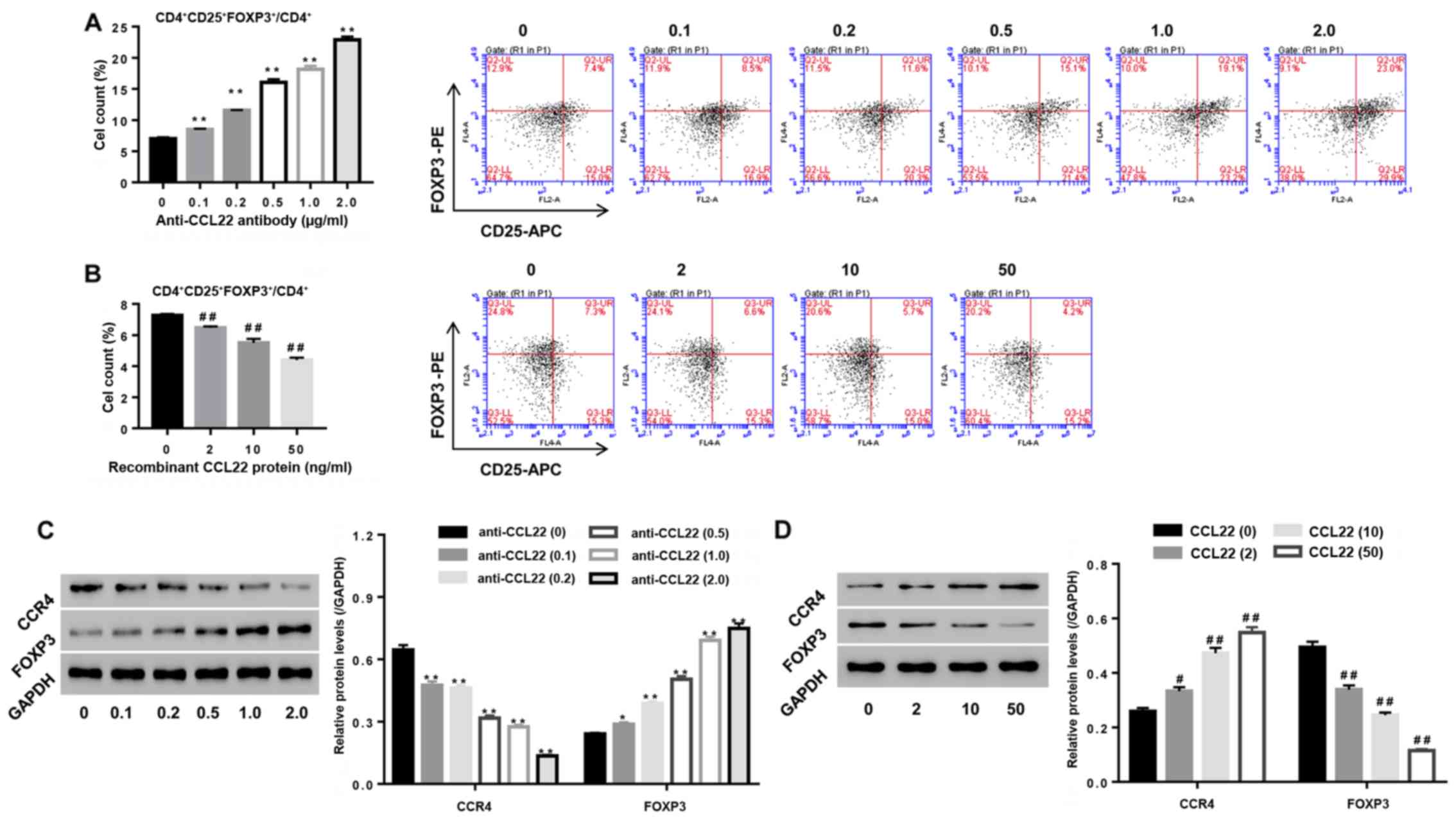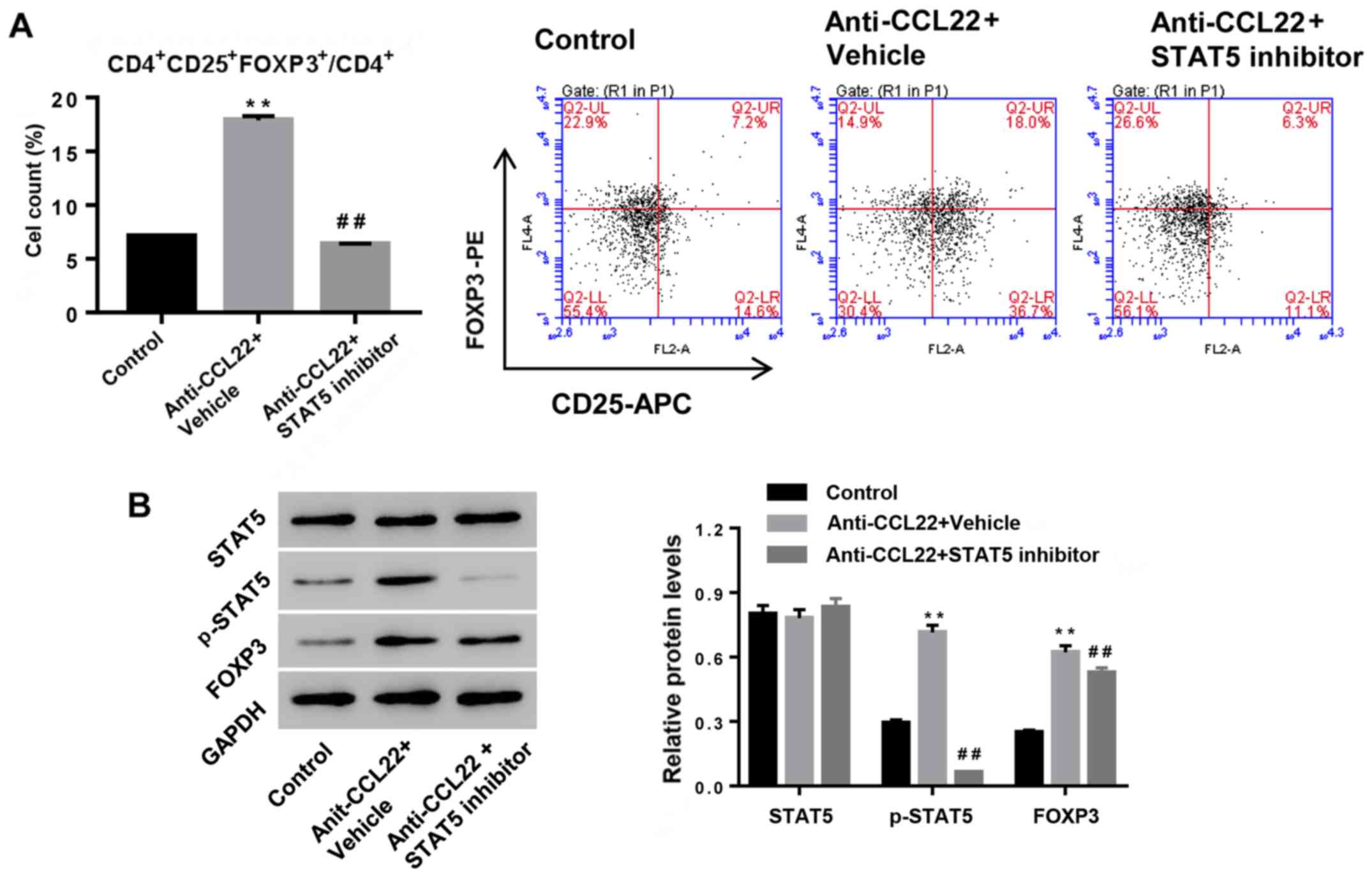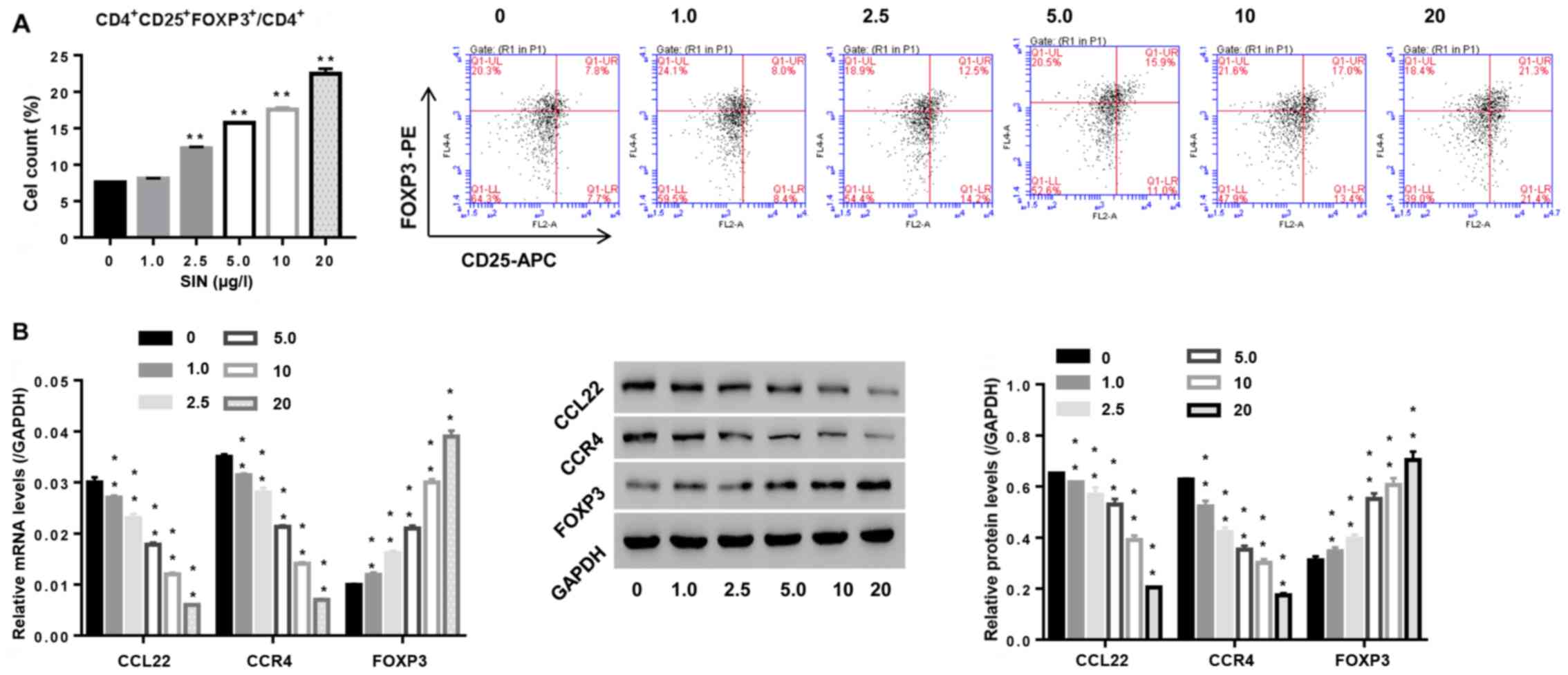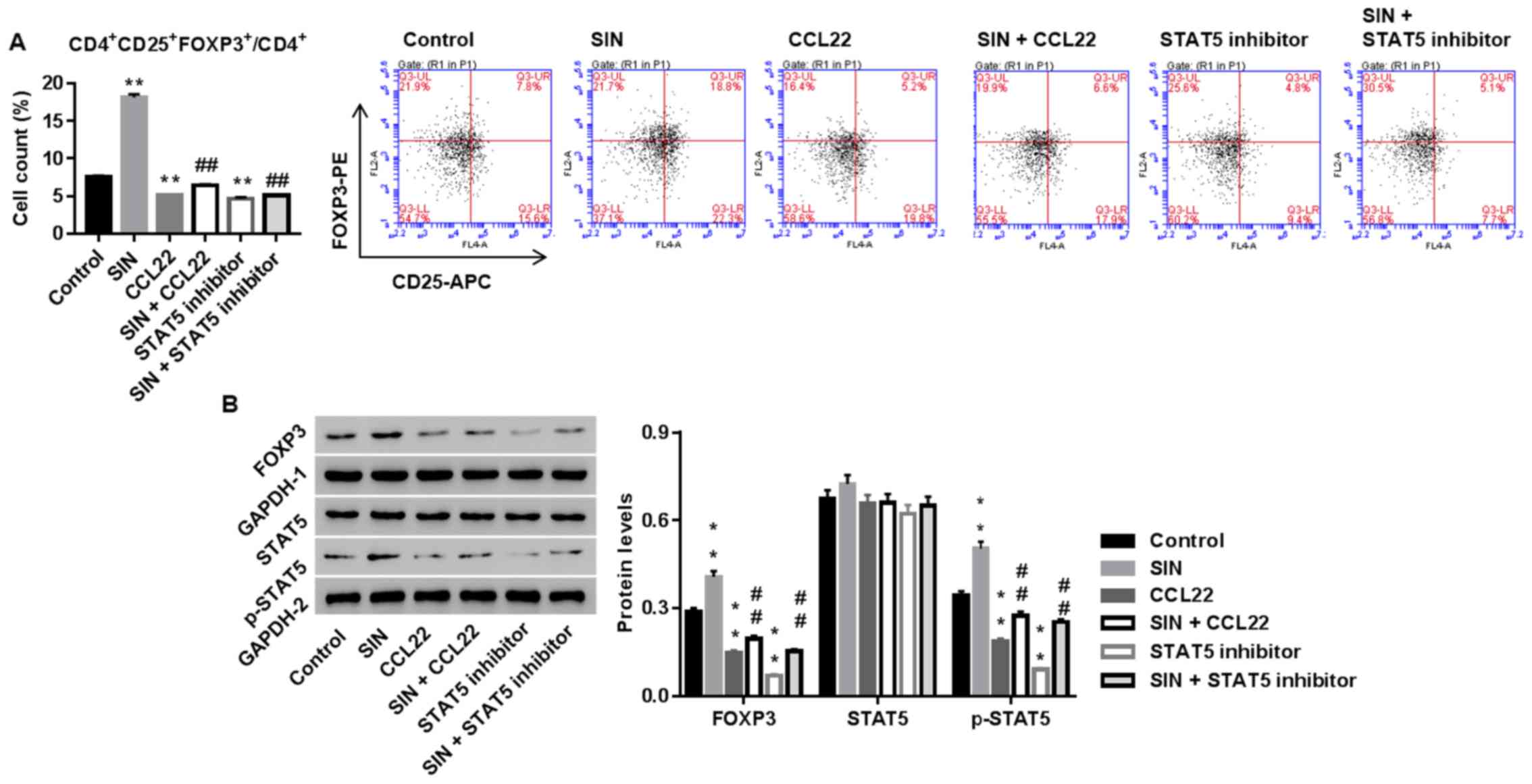|
1
|
Kurkó J, Besenyei T, Laki J, Glant TT,
Mikecz K and Szekanecz Z: Szekanecz, immunology, genetics of
rheumatoid arthritis - A comprehensive review. Clin Rev Allergy
Immunol. 45:170–179. 2013. View Article : Google Scholar : PubMed/NCBI
|
|
2
|
Hong Q, Song XY, Huang JY and Guo Y:
CD4+CD25+Foxp3+ regulatory T cell
content in peripheral blood and synovial fluid of patients with
rheumatoid arthritis and osteoarthritis. Zhongguo Shengwuzhipinxue
Zazhi. 24:169–172. 2011.(In Chinese).
|
|
3
|
Bayry J, Sibéril S, Triebel F, Tough DF
and Kaveri SV: Rescuing CD4+CD25+ regulatory
T-cell functions in rheumatoid arthritis by cytokine-targeted
monoclonal antibody therapy. Drug Discov Today. 12:548–552. 2007.
View Article : Google Scholar : PubMed/NCBI
|
|
4
|
Leipe J, Skapenko A, Lipsky PE and
Schulze-Koops H: Regulatory T cells in rheumatoid arthritis.
Arthritis Res Ther. 7:932005. View
Article : Google Scholar : PubMed/NCBI
|
|
5
|
Yu Q, Xu M, Yu F and Jin Y: CD4(+)CD25(+)
regulatory T cells as a therapeutic target in rheumatoid arthritis.
Cent Eur J Immunol. 39:100–103. 2014. View Article : Google Scholar : PubMed/NCBI
|
|
6
|
Yi H and Zhao Y: Chemokines, chemokine
receptors and CD4+CD25+ regulatory T cells.
Expert Rev Clin Immunol. 3:343–349. 2007. View Article : Google Scholar : PubMed/NCBI
|
|
7
|
Flytlie HA, Hvid M, Lindgreen E,
Kofod-Olsen E, Petersen EL, Jørgensen A, Deleuran M, Vestergaard C
and Deleuran B: Expression of MDC/CCL22 and its receptor CCR4 in
rheumatoid arthritis, psoriatic arthritis and osteoarthritis.
Cytokine. 49:24–29. 2010. View Article : Google Scholar : PubMed/NCBI
|
|
8
|
Burchill MA, Yang J, Vogtenhuber C, Blazar
BR and Farrar MA: IL-2 receptor beta-dependent STAT5 activation is
required for the development of Foxp3+ regulatory T
cells. J Immunol. 178:280–290. 2007. View Article : Google Scholar : PubMed/NCBI
|
|
9
|
Mahmud SA, Manlove LS and Farrar MA:
Interleukin-2 and STAT5 in regulatory T cell development and
function. JAK-STAT. 2:e231542013. View Article : Google Scholar : PubMed/NCBI
|
|
10
|
Passerini L, Allan SE, Battaglia M, Di
Nunzio S, Alstad AN, Levings MK, Roncarolo MG and Bacchetta R:
STAT5-signaling cytokines regulate the expression of FOXP3 in
CD4+CD25+ regulatory T cells and
CD4+CD25− effector T cells. Int Immunol.
20:421–431. 2008. View Article : Google Scholar : PubMed/NCBI
|
|
11
|
Hintzen C, Haan C, Tuckermann JP, Heinrich
PC and Hermanns HM: Oncostatin M-induced and constitutive
activation of the JAK2/STAT5/CIS pathway suppresses CCL1, but not
CCL7 and CCL8, chemokine expression. J Immunol. 181:7341–7349.
2008. View Article : Google Scholar : PubMed/NCBI
|
|
12
|
Betts BC, Veerapathran A, Pidala J, Yu XZ
and Anasetti C: STAT5 polarization promotes iTregs and suppresses
human T-cell alloresponses while preserving CTL capacity. J Leukoc
Biol. 95:205–213. 2014. View Article : Google Scholar : PubMed/NCBI
|
|
13
|
Li N, Deng Y, Zhou JR, Song GZ and Wang
JY: Effect of sinomenine on the proportion of T helpers 17 and
regulatory T cells in puerperal blood mononuclear cells from
patients with rheumatoid arthritis. Shanghai Med J. 36:254–258.
2013.
|
|
14
|
Fahy O, Porte H, Sénéchal S, Vorng H,
McEuen AR, Buckley MG, Walls AF, Wallaert B, Tonnel AB and
Tsicopoulos A: Chemokine-induced cutaneous inflammatory cell
infiltration in a model of Hu-PBMC-SCID mice grafted with human
skin. Am J Pathol. 158:1053–1063. 2001. View Article : Google Scholar : PubMed/NCBI
|
|
15
|
Nishikawa H and Sakaguchi S: Regulatory T
cells in tumor immunity. Int J Cancer. 127:759–767. 2010.PubMed/NCBI
|
|
16
|
Antov A, Yang L, Vig M, Baltimore D and
Van Parijs L: Essential role for STAT5 signaling in
CD25+CD4+ regulatory T cell homeostasis and
the maintenance of self-tolerance. J Immunol. 171:3435–3441. 2003.
View Article : Google Scholar : PubMed/NCBI
|
|
17
|
Huang Z, Chen L, Yang B, Chen J and Wang
L: Decreased phosphostat5 contributed to impairment of
CD4+CD25+Foxp3+ Tregs in RA
patients. Ann Rheum Dis. 75 (Suppl 2):9872016. View Article : Google Scholar
|
|
18
|
Tong B, Yu J, Wang T, Dou Y, Wu X, Kong L,
Dai Y and Xia Y: Sinomenine suppresses collagen-induced arthritis
by reciprocal modulation of regulatory T cells and Th17 cells in
gut-associated lymphoid tissues. Mol Immunol. 65:94–103. 2015.
View Article : Google Scholar : PubMed/NCBI
|



















